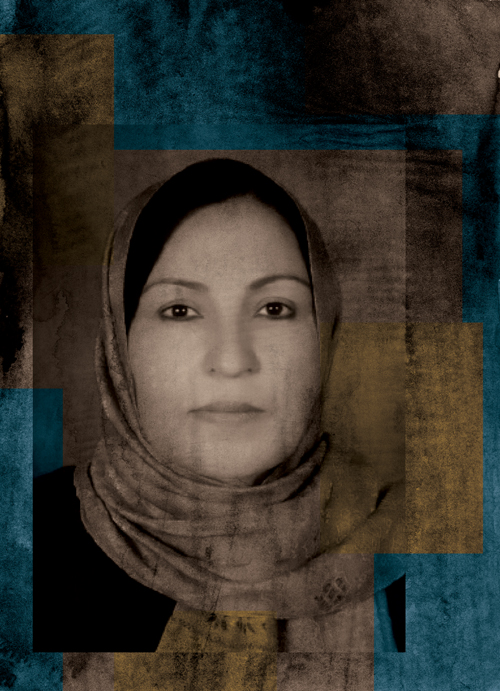Aziza Khayrandish is a human rights activist and the director of the Civil Society and Human Rights Network in Herat
Can you tell us about a time when your civil rights were violated?
During the time of the Taliban, I used to have to wait a long time for my bus. It was often full when it arrived, with just one free seat at the front. The men wouldn’t allow me to sit there. In those days, it was very clear that women were considered second-class citizens. One day, I decided to sit in the front seat anyway. An angry man sitting behind me said, “We men fought a life-time in the jihad, and you women have no shame. How dare you sit there in the front, next to the driver?”
What are some important achievements since the time of the Taliban in Afghanistan?
The influx of financial aid and the increased focus on women has given rise to a number of positive developments for women in Afghanistan. The culture of violence is losing its power. And we are enjoying a greater measure of democracy in the country.
What gives you hope for the future?
There are a number of things, particularly regarding the changes we see in families. For instance, families, whether they are rich or poor, are increasingly interested in and pushing their children towards education. At the same time, the birth rate is decreasing. All of these examples indicate the movement towards urbanization and modernization in Afghanistan.
What is your worst fear today?
There is still some cause for concern, especially in relation to the peace process that is supposed to lead to reconciliation with the Taliban and the withdrawal of Western military forces. If the price of peace is sacrificing justice and all the progressive values that have started to take root in our society, it will be catastrophic for the women of Afghanistan, just like it was before. If those who oppose even the essence of a female identity enter the government, we will lose everything all over again.
What are the three biggest challenges facing Afghanistan?
Corruption in the administration, a weak rule of law, and the continued presence of warlords in the upper echelons of power are the major challenges we face. The warlords will always seek to put themselves above the law, and the law becomes a tool that is only applied selectively against the weak.
Will the present-day Afghanistan allow a recurrence of the closing of schools to girls and the blocking of women’s social participation?
I am not too pessimistic; I don’t believe we’ll see a repeat of those dark days. But, if the Taliban entered the government, I expect they would try to implement Article 3 of the Constitution, which says that “no law can be contrary to the beliefs and provisions of the sacred religion of Islam”. Since the Taliban take an extremist interpretation of Islam, this could see a bitter repeat of the exclusion of girls from schools and women from society.
What are some factors which deter women’s participation in social, economic, political and cultural spheres?
First and foremost, we are confronted by an extremely male-centric and patriarchal culture, which says that men are superior to women and that women’s rights count for only half that of men’s. Furthermore, this misogynist mentality is bound up in, and reinforced by, extremist interpretations of Islam. At the same time, the economic dependence of women acts as another deterrent to their participation.
What do women in Afghanistan want?
Though the status quo is far from ideal, women hope it will not deteriorate or regress and that they will at least retain the achievements and progress they have made to date. Secondly, we need to move away from these misogynistic interpretations of Islam and change the culture that supports them. Without combating the misogynist culture head-on, nothing will change in the society. More needs to be done for the financial independence of women. They need opportunities to build their skills and have access to employment.
What the sources and centres of power which women can rely on to promote their rights and demands?
The presence of the international community in the country offers a great deal of hope and opportunity. Unfortunately, the government has not worked to gain the trust of the international community, even though this trust is fundamental to strengthening the government’s actions and legitimacy. The women’s rights and human rights organisations are also key support systems.
What do you wish for your daughter?
I wish that all the girls of my country could enjoy the same rights as their brothers do.
Do you have a specific message? I have two messages: one for the women and one for the men. To the women, I say, become aware of your own power. When we believe in ourselves, our power grows enormously, and in this way we find the strength to play a more active role in society. To the men, I say, support our women. Let your wives and daughters study and continue their education.
“Unveiling Afghanistan, the Unheard Voices of Progress” is a campaign by Armanshahr and FIDH, which explores views held by Afghan civil society actors. Over 50 days, 50 influential social, political, and cultural actors hope to spark conversation and debate about building a society that is inclusive of women’s and human rights in Afghanistan.
Follow 50 interviews drawn from the “Unveiling Afghanistan campaign” daily on the Huffington Post. Follow Unveiling Afghanistan on FIDH Twitter: www.twitter.com/fidh_en


